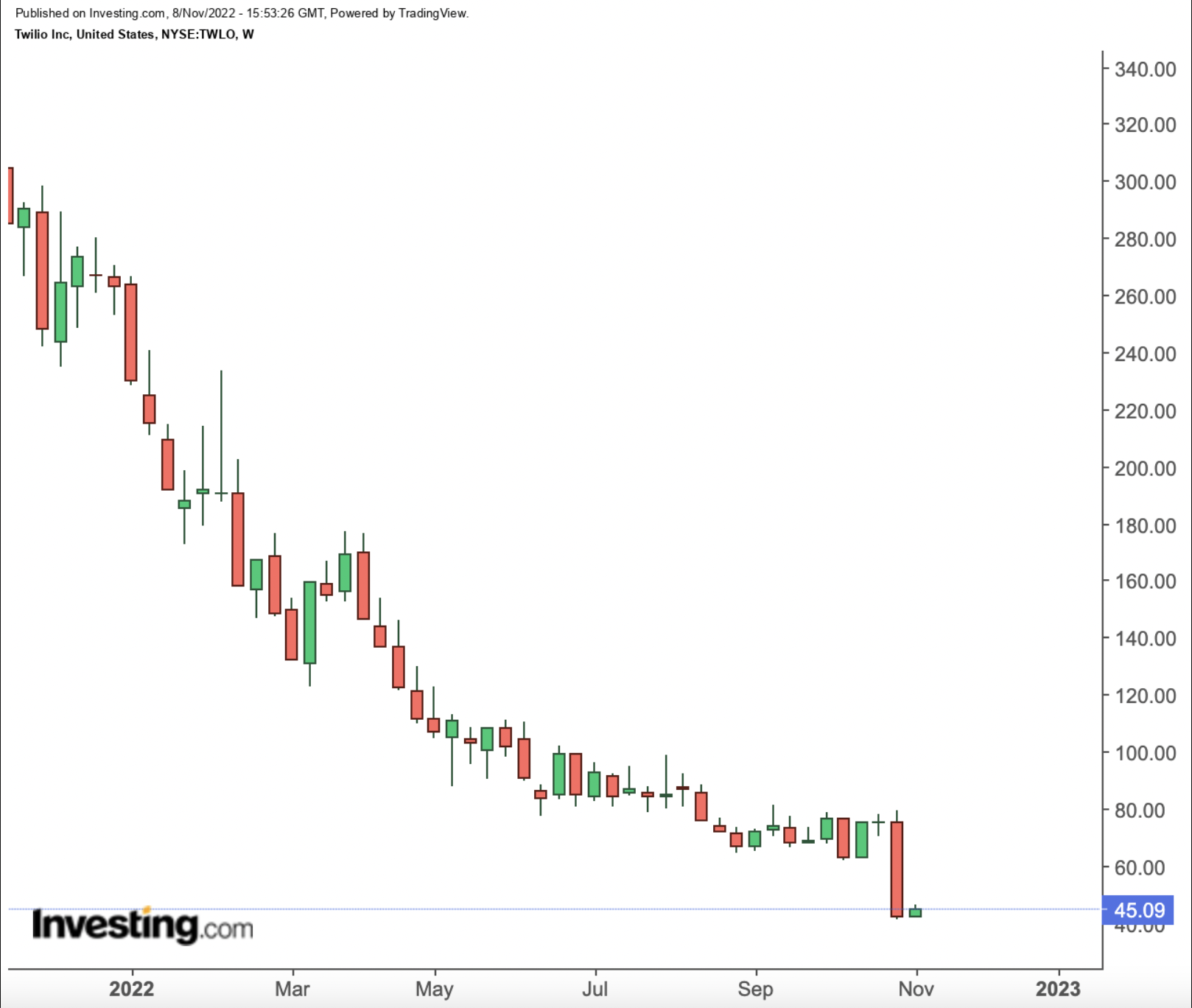United Homes Group stock plunges after Nikki Haley, directors resign
- The bull case for TWLO stock seems easy to make at a four-year low
- But the business is facing real challenges — and management isn’t responding
- Longer-term, this can still work, but there’s no need to step into the steep sell-off
At the moment, the bull case for Twilio (NYSE:TWLO) stock looks simple and attractive. Amid a continued rout in tech stocks, TWLO has declined a stunning 83% so far this year. And at these levels, the stock simply looks too cheap.

Source: Investing.com
Based on guidance for the fourth quarter, Twilio should generate about $3.8 billion in revenue this year. With a little more than $3 billion in cash net of debt on the balance sheet, and a fully-diluted market capitalization of around $9 billion, the company’s enterprise value is about $5.8 billion.
In other words, TWLO is trading at 1.5x-1.6x EV/revenue. Yet, that revenue should increase 18% to 19% in the fourth quarter — based on guidance that badly disappointed investors and analysts. Longer-term, messaging demand should continue to grow, and Twilio is building out a software business as well.
It’s an intriguing case. I wouldn’t blame an investor for buying that case. Indeed, many did on Monday as TWLO bounced nearly 7% following a 34% plunge last Friday after the Q3 earnings release. But it’s a case that doesn’t look quite as attractive as it first appears — at least not yet.
The Messaging Problem
In retrospect, it’s clear that one of the many mistakes investors made during the euphoric market of 2020 and 2021 was blindly comparing EV/revenue multiples across industries. For a fast-growing software company with gross margins above 80%, a 15x or even 25x EV/revenue might — emphasis on ‘might’ — make some sense.
But at its highs TWLO received that valuation even though it isn’t really a software company. According to last week’s Investor Day presentation, over the past four quarters just 11% of the company’s revenue has come from software. Most revenue, 84%, has come from the communications segment, with two-thirds of that from messaging.
The problem is that messaging is not that great a business. To some degree, it’s commoditized. It’s admittedly not as simple as arguing that an SMS message from Twilio is the same as an SMS message from any other company — but there’s some truth to it.
More importantly, gross margins in messaging simply are not that high. Again, according to the Investor Day presentation, non-GAAP gross margins over the past four quarters are just 33%. Even that figure excludes share-based compensation. The figure has dropped sharply from 41% in 2020 — in large part because international markets are much less profitable with year-to-date gross margins of just 23%.
Those low margins provide a headwind toward margin expansion for the business as a whole — a business that even on an adjusted basis remains unprofitable. And Q3 earnings highlight another concern as well: competition.
While TWLO stock plunged after earnings, shares of its rival Bandwidth (NASDAQ:BAND) soared following Q3 results. Twilio issued disappointing guidance for Q4, Bandwidth raised its full-year outlook.
Twilio attributed its weakness to macroeconomic problems, particularly with customers in end markets like cryptocurrency, Internet retail and social media. But those industries might not be dealing with a recession, but simply the end of a boom.
In other words, right now, Twilio’s messaging business looks like it might have been a pandemic winner. That, in turn, suggests that the growth slowdown is likely to continue into 2023 and potentially beyond, with rivals like Bandwidth potentially taking share.
Investor Day and the Profitability Problem
The juxtaposition of results against Bandwidth provided one reason for caution with Twilio stock. The Investor Day presentation provided several more.
It bears repeating: this is not a profitable business at the moment. Q4 guidance suggests an adjusted operating loss of about $35 million for full-year 2022. But that adjusted figure excludes a stunning amount of share-based compensation: likely in the range of $750 million this year. That’s close to 20% of revenue.
The days of investors willingly swallowing that kind of dilution are over. But Twilio isn’t responding in kind. The company expects share-based comp to increase even further next year, despite layoffs during the third quarter. Its “medium-term” goal is for share-based comp to reach 15-20% of revenue.
That is far, far too high. That’s particularly true because Twilio over the same period is only guiding for 100 to 300 basis points in annual operating margin expansion.
Guidance suggests margins this year of about -1%. And so investors are looking at years — as in five years-plus — for Twilio to get to the point where its operating profits are positive without the help of share issuance to employees. That’s even assuming the company’s multi-year outlook is hit; gross margin and competitive challenges suggest at least a possibility it won’t.
The fundamental problem of ‘true’ profitability being pushed out is amplified by the tone-deaf nature of Twilio’s planning. This is not 2021. Investors aren’t going to put a high EV/revenue multiple on the messaging business. They’re not going to tolerate equity comp that totals 20% of sales. Even a $29-million charge for a company sabbatical program looks ludicrous in the context of ongoing losses and the flood of tech workers unfortunately leaving other companies at the moment.
Taking the long view, perhaps Twilio’s strategy still can work out. The software business is growing nicely. The company has woven together a potentially end-to-end customer experience platform that can drive higher revenue — and better margins — for years to come.
But in the meantime, the risks here are real. The market didn’t dump TWLO last week for no good reason, or because tech stocks on the whole are down. Twilio needs to give investors a reason to buy — and last week, it simply did not do so.
Disclaimer: As of this writing, Vince Martin has no positions in any securities mentioned.
